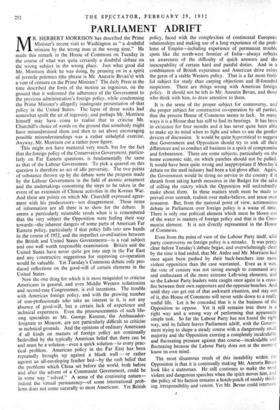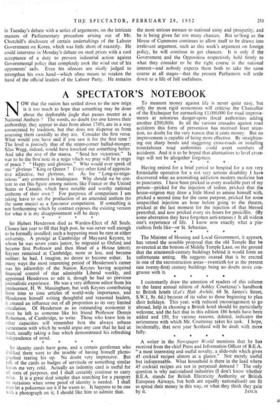PARLIAMENT ADRIFT
MR. HERBERT MORRISON. has described the Prime Minister's recent visit to Washington as "a doubtful mission by the wrong man at the wrong time." He made this remark in the House of Commons on Tuesday in the course of what was quite certainly a doubtful debate on the wrong subject in the wrong place. Just what good did Mr. Morrison think he was doing, by pressing on in a spirit of juvenile polemics (the phrase is Mr. Aneurin Bevan's) with a vote of censure on the Prime Minister? The daily Press at the time described the form of the motion as ingenious, on the ground that it welcomed the adherence of the Government to the previous administration's foreign policy, while condemning the Prime Minister's allegedly inadequate presentation of-that policy in the United States. The lapse of three weeks had somewhat spoilt the air of ingenuity, and perhaps Mr. Morrison himself may have come to realise that to criticise Mr. Churchill's choice of words on the ground that somebody might have misunderstood them and then to set about encouraging possible misunderstandings was a rather unhelpful exercise. Anyway, Mr. Morrison cut a rather poor figure.
This might not have mattered very much, but for the fact that the foreign policy of the Conservative Government, particu- larly on Far Eastern 'questions, is fundamentally the same as that of the Labour Government. To pick a quarrel on this question is therefore an act of idle perversity. The two points of substance thrown up by the debate were the progress made by the Labour Government in the field of atomic armament and the undertakings concerning the steps to be taken in the event of an extension of Chinese activities in the Korean War. And these are points on which Mr. Churchill expressed agree- ment with his predecessors—not disageement. These items of information are all there is to show for the debate. It seems a particularly miserable result when it is remembered that the very subject the Opposition were feeling their way towards—the inherent dangers of some parts of American Far Eastern policy, particularly if that policy falls into new hands in the course of 1952, and the imperfect co-ordination between the British and United States Governments—is a real subject and one well worth responsible examination. Britain and the United States have never quite got into step in the Far East and any constructive suggestions for improving co-operation would be valuable. Yet Tuesday's Commons debate only pro- duced reflections on the good-will of certain elements in the United States.
Now the one thing for which it is most misguided to criticise Americans in general, and even Middle Western isolationists and second-rate Congressmen, is evil intentions. The trouble with American foreign policy, and with the growing number of non-professionals who take an interest in it, is not any absence of good-will, but a certain lack of experience and technical expertness. Even the pronouncements of such life- ong specialists as Mr. George Kenna% ( the Ambassador- • lesignate to Moscow, are not particularly difficult to criticise m technical grounds.. And the opinions of ordinary Americans if all kinds on matters of foreign policy are continually bedeviled by the typically American belief that there can be and must be a solution—even a quick solution—to every prac- tical problem. American policy in the Far East has been repeatedly brought up against a blank wall — or rather against an all-enveloping feather bed—by the rash belief that the problems which China set before the world, both before and after the advent of a Communist Government, could be in some way "solved." A sense of the continuing nature— indeed the virtual permanency—of some international prob- lems does not come naturally to most Americans. Yet British policy, faced with the complexities of continental European relationships and making use of a long experience of the prob- lems of Empire—including experience of permanent trouble spots like the north-west frontier of India—always reflects an awareness of the difficulty of quick answers and the inescapability of certain hard and painful duties. And in a combihation of British experience and American drive exists the germ of a stable Western policy. That is a far more fruit- ful subject for study than carping objections and ill-founded suspicions. There are things wrong with American foreign policy. It should not be left to Mr. Aneurin Bevan, and those who think with him, to draw attention to them.
It is the sense of the proper subject for controversy, and the proper subject for constructive co-operation by all parties, that the present House of Commons seems to lack. In many ways it is a House that has still to find its bearings. It has been in existence for four months and it has never quite been able to make up its mind when to fight and when to use the gentler devices of discussion. It would be quite hypocritical to suggest that Government and Opposition should try to sink all their differences and to conduct all business in a spirit of compromise and forbearance. There are some subjects, particularly on the home economic side, on which punches should not be pulled. It would have been quite wrong and inappropriate if Monday's debate on the steel industry had been a kid glove affair. Again, .the Government would be doing no service to the country if it shrank from taking harsh measures in the Budget for the sake of stilling the outcry which the Opposition will undoubtedly make about them. In these matters truth must be made to prevail over untruth, realism over make-believe, and sense over nonsense. But, from the national point of view, acrimonious debate in Parliament over foreign policy is a waste of time.
There is only one political element which must be blown out Ed the water in matters of foreign policy and that is the Com- munist element. It is not directly represented in the House of Commons.
Even from the point of view of the Labour Party itself, wild party controversy on foreign policy is a mistake. It was pretty clear before Tuesday's debate began, and overwhelmingly clear by the time it had ended, that Mr. Attlee and Mr. Morrison had once again been pushed by their back-benchers into more violent opposition than the case warranted. Even as it was, the vote of censure was not strong enough to command any real enthusiasm of the more extreme Left-wing elements, and so the Labour Party leaders were caught once again in a cross- fire between their own supporters and the opposite benches. And until they can get out of that awkward situation, and stay out of it, this House of Commons will never settle down to a really useful life. Let it be conceded that it is the business of the Opposition to oppose. Yet it still remains true there is a right way and a wrong way of performing that apparently simple task. So far the Labour Party has not found the right way, and its failure leaves Parliament adrift, with the Govern- ment trying to shape a steady course with a dangerously small majority and the Opposition exerting a completely incalculable and fluctuating pressure against that course—incalculable and fluctuating because the Labour Party does not at the moment know its own mind.
The most disastrous result of this instability within the Opposition is that it is continually making Mr. Aneurin-Bevan look like a statesman. He still continues to make the most violent and dangerous speeches when the spirit moves him, and the policy of his faction remains a hotch-potch of muddy think- ing, irresponsibility and venom. Yet Mr. Bevan could intervene in Tuesday's debate with a series of arguments, on the intricate matters of Parliamentary procedure arising out of Mr. Churchill's disclosure of certain undertakings of the Labour Government on Korea, which was little short of masterly. He could intervene in Monday's debate on steel prices with a cool acceptance of a duty to prevent industrial action against Government#1 policy that completely took the wind out of his opponents' sails. Even his silences are nicely judged to strengthen his own hand—which often means to weaken the hand of the official leaders of the Labour Party. He remains the most serious menace to national unity and prosperity, and he is being given far too many chances. But so flong as the House of Commons continues to allow itself to be drawn into irrelevant argument, such as this week's argument on foreign policy, he will continue to get chances. It is only if the Government and the Opposition respectively hold firmly to what they consider to be the right course in the national interest—and nobody expects them both to take the same course at all stages—that the present Parliament will settle down to a life of full usefulness.



































 Previous page
Previous page